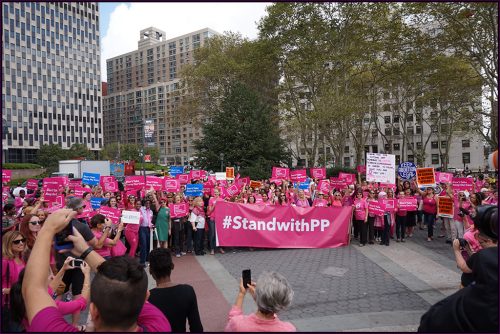Planned Parenthood is a Key Provider of Women’s Health Care in the U.S.
By Aishah Abdala · March 8, 2017
Results in Texas show that defunding women's health is a bad idea. A series of recorded videos were released by anti-abortion activists attempting to portray Planned Parenthood as breaking federal abortion laws to discredit the health services they offer to over millions of women and families. The videos have since been debunked, and investigations in several states have shown no evidence of illegal behavior by Planned Parenthood. Yet these videos have continued to encourage the 30-year long fight to cut Planned Parenthood’s federal funding.
Despite efforts to slash funding, several states recognize that cutting funding to one of our nation’s most critical family planning services is not as simple as originally thought. It also requires serious consideration in order to avoid dangerous health consequences.
An explicit budget line dedicated to Planned Parenthood does not exist. Instead Planned Parenthood receives federal funding by being reimbursed for every patient served that is eligible for Medicaid or Title X programs. This includes a variety of preventative and primary care services, including contraception, cancer screenings and sexually transmitted disease testing and treatment but not abortion services. While anti-abortion activists claim that defunding Planned Parenthood would save lives, the reality is that cutting funding would only restrict the set of providers that women and families can turn to for their basic health needs, especially in rural and low income communities.
Many defunding proponents claim that the state’s Federally Qualified Health Centers (FQHCs) can absorb the patients that would have otherwise been served by Planned Parenthood, without a change in access. The data shows otherwise.
Of the 13,540 nationwide FQHCs listed, a large majority of them do not have the necessary staff to deliver a comprehensive list of certified reproductive health care for women on site. Only 34-56% of FQHCs provided oral contraceptives or refills on site compared to 83% of Planned Parenthood clinics. FQHCs’ inability to meet demands for reproductive care is driven by the U.S.’s serious shortage of obstetrician/gynecologists--let alone ob/gyns that deliver services to Medicaid-eligible patients. About half of all U.S. counties do not have a single ob/gyn and 56% do not even have a nurse midwife.
As a result, Planned Parenthood has been a key provider in filling in this void and actually provides a disproportionately higher share of reproductive health services, specially to safety net clients. Planned Parenthood provides contraceptive services to about 36% of safety-net clients nationally, while FQHC’s serve 16% of safety-net clients. Cutting funding to Planned Parenthood will not only drive an unsustainable demand on FQHCs, which already experience challenges providing safety net health care services with limited reimbursement, but it would also severely limit access to sensitive services such as abortion and certain forms of contraception.
Additionally about 68% of U.S. counties with Planned Parenthood centers have clinics that serve at least half of the county’s safety-net family planning clients. In approximately20% of these counties, Planned Parenthood is the only safety net family planning center. This data shows that Planned Parenthood has dedicated itself to delivering services for low income women and families in disinvested areas where access to providers is extremely limited. If their funding were to be further restricted, there would be serious threats to access for family planning services and women’s reproductive health care in communities with high need.
Still, several state legislatures, including Texas, have tried to reduce their state contribution to Planned Parenthood by cutting their Medicaid costs for family planning. Texas led this misguided approach in 2011 which instead resulted in closing 1 in 4 state family planning clinics over the course of 2 years, including public and nonpublic agencies that may also provide primary care. A study found a correlation that noted a double percent increase in maternal deaths after the state imposed severe budget cuts on Planned Parenthood.
Based on these observations, the Department of Health and Human Services has already issued warnings against states planning to cut Planned Parenthood from Medicaid programs, as it would violate laws requiring Medicaid patients to have reasonable choice to use any qualified provider. More recently, federal courts have blocked several efforts to cut Planned Parenthood from Medicaid funding in six states including Texas, Arkansas, Alabama, Kansas, Mississippi and Louisiana.
Despite the appeared success of these rulings, it is important to continue supporting the critical work of Planned Parenthood in the midst of baseless accusations grounded on the ideological disapproval of abortion services. Planned Parenthood continues to be attacked for being the single greatest provider of abortions in the U.S. The reinstatement of the Mexico City Policy is reflective of the strong opposition to defund organizations that provide abortions at all. But the reality is that Planned Parenthood plays a significant role in the U.S. as a provider of quality reproductive and family planning care including access to safe abortions. Any effort to undermine their resources could produce great harm to women's and family’s health. We must support and defend Planned Parenthood in their efforts to maintain the rights of women and families to access high quality health care.
To donate to planned parenthood please visit their site: https://secure.ppaction.org/site/Donation2?12913.donation=form1&df_id=12913
___________ Aishah is an intern here at The Praxis Project and a soon to be graduate at UC Berkeley. Her full bio can be found on our Staff Page.



